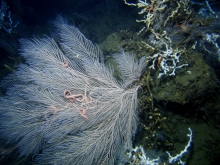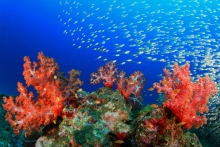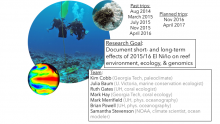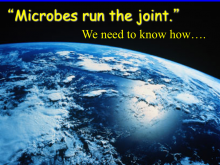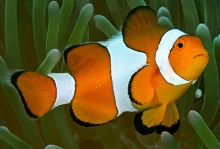- You are here:
- GT Home
- Sciences
- Home
- List of Available Research Projects
An interdisciplinary project to explore the physical, chemical and biological factors that promote the growth of Sargassum blooms in the Tropical Atlantic and investigate the factors that may have changed in recent years (last decade). A novel combination of ecological approaches, remote sensing products, physical modeling, and oceanographic work at sea will be used to investigate and resolve the mechanisms that drive the onset of Sargassum blooms in the Central Tropical Atlantic and their growth and development in waters of the Western Tropical North Atlantic.
Coral reefs have tremendous environmental, economic, and cultural value but are in dramatic global decline. Over the last 4 decades, coral cover on Caribbean reefs has declined by ~80% and on Pacific reefs by more than 50%. Declines are being driven by a host of anthropogenic stresses including global change, overfishing, pollution, and disease spread, but all of these stresses generally result in losses of corals, increases in seaweeds, and then a loss of reef resilience as seaweeds dominate and suppress corals.
Geochemical time series from remote Pacific atolls have provided long records of climate variability that extend into the pre-industrial era. Recent studies document a wide range of geochemical variability in corals growing on the same reef, ostensibly of the same genus. Deciphering which fraction of coral geochemistry variations are driven by changes in physical environment versus physiological differences between corals is key to constructing more robust records of past climate variability.
Seaweeds create toxic compounds to deter consumers (fish) and poison competitors (corals). However specific fishes resist these toxins, and some corals also are resistant to their effects. These tolerances may be due to unusual microbes in the gut microbiomes of fishes and in coral mucus coverings. GT has an unusual mixture of marine ecologists, chemists and microbiologists to address these issues.
Native microbial communities (microbiomes) of the vertebrate gut exert vital effects on host ecology, physiology, and evolution. This project explores the potential that the gut microbiome of herbivorous fish plays a vital role in biochemically degrading algal toxins consumed by the host fish, and therefore structuring diet choice and ecology. The student will work jointly between the labs of Drs. Mark Hay and Frank Stewart to test this broad hypothesis, likely focusing on the microbiomes of specific coral reef herbivores.

